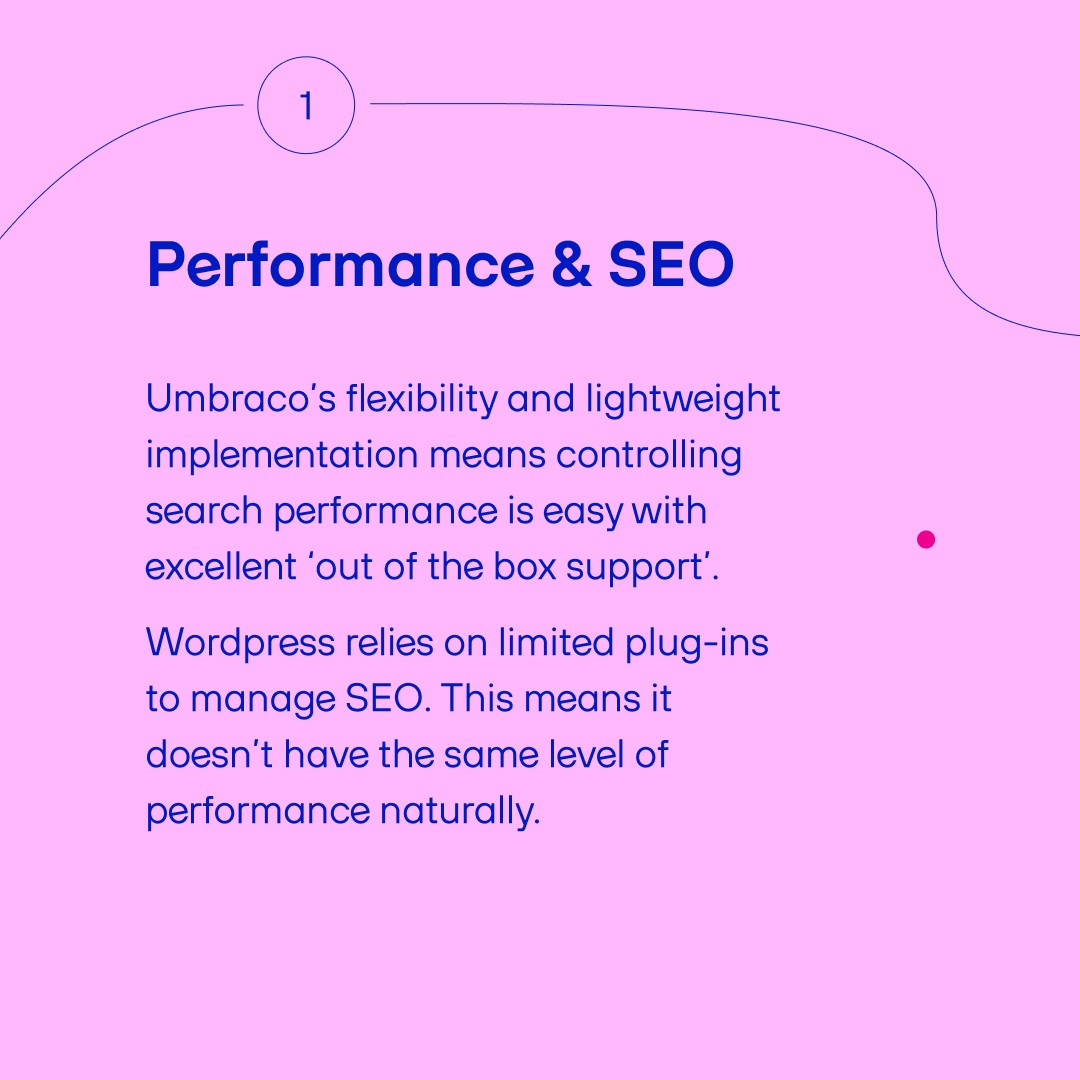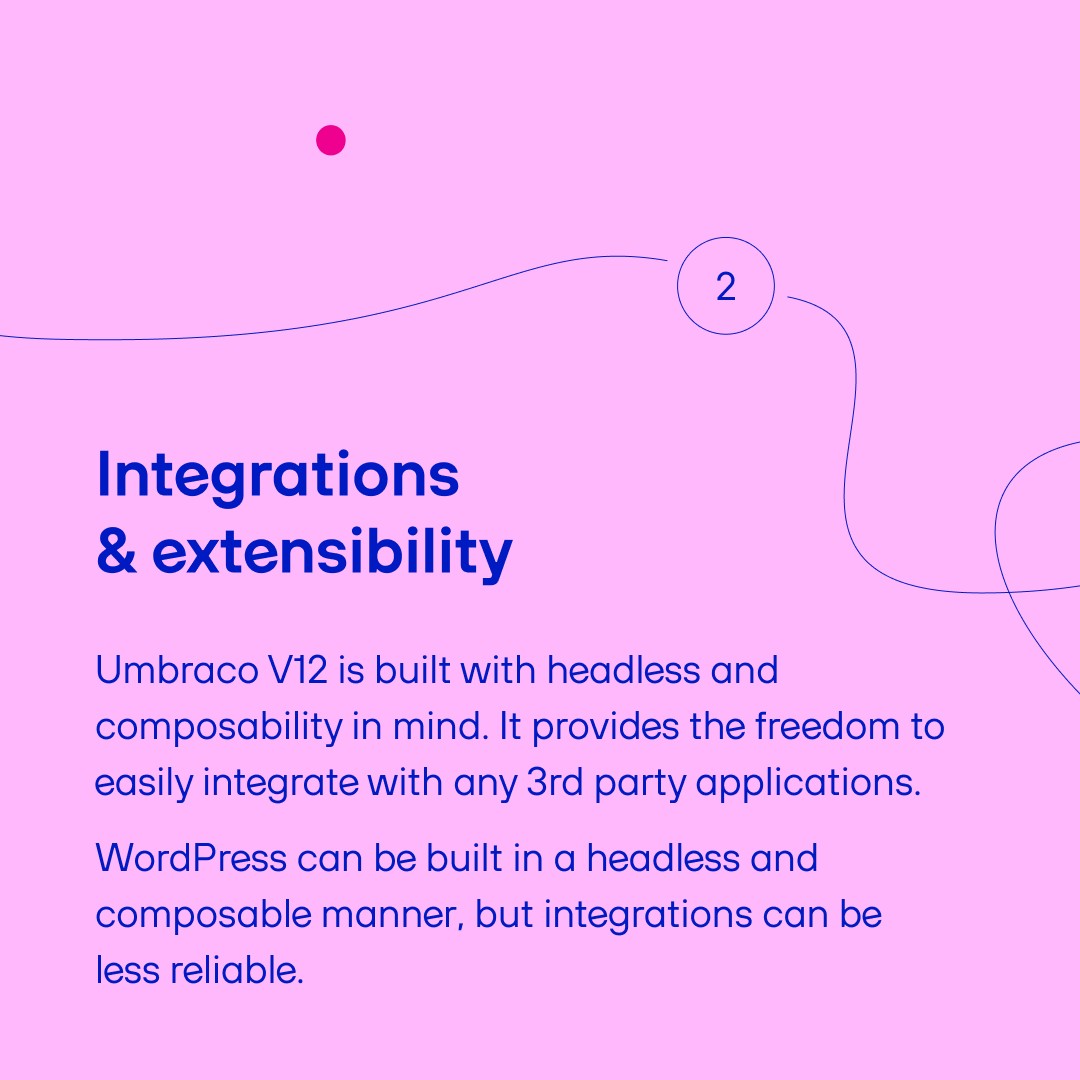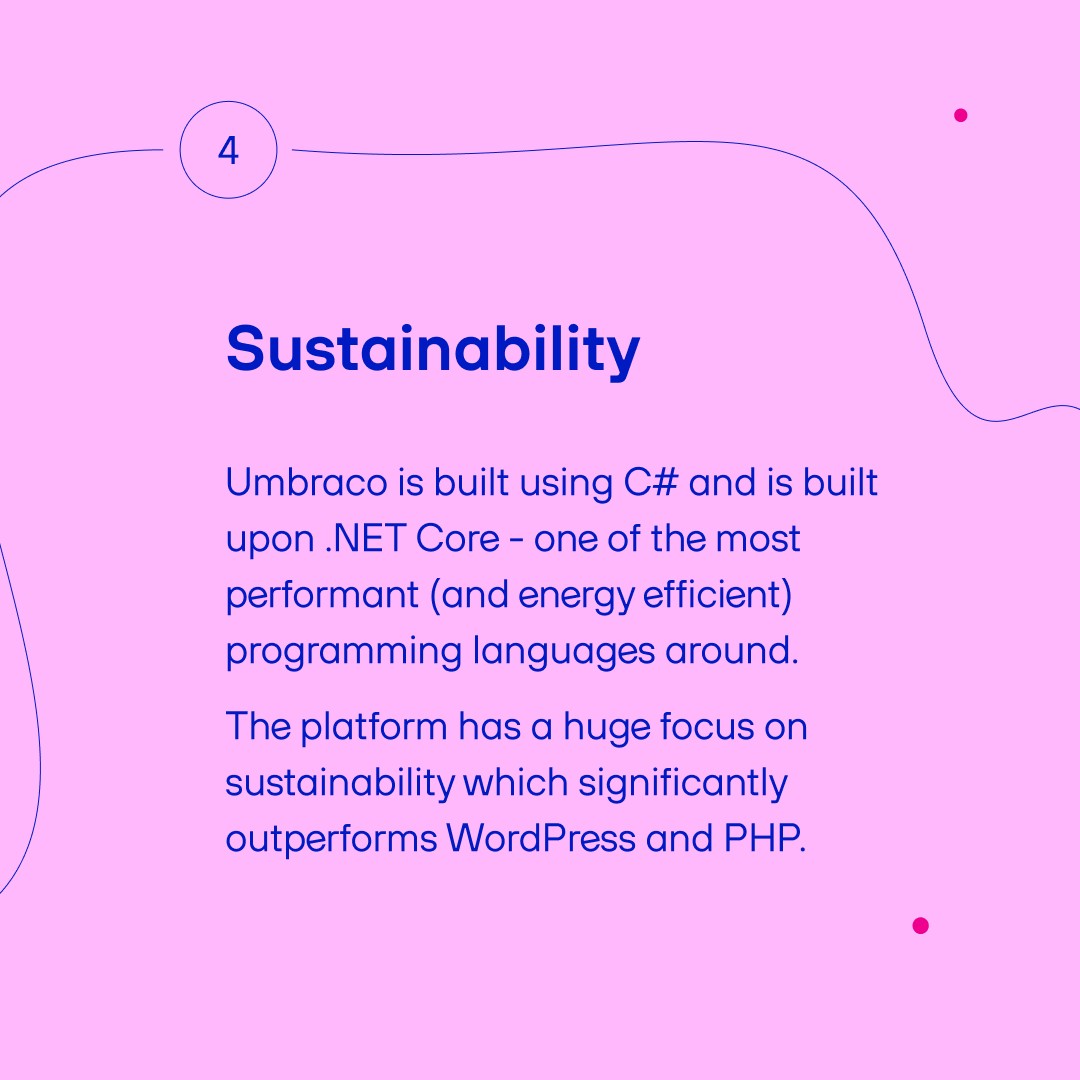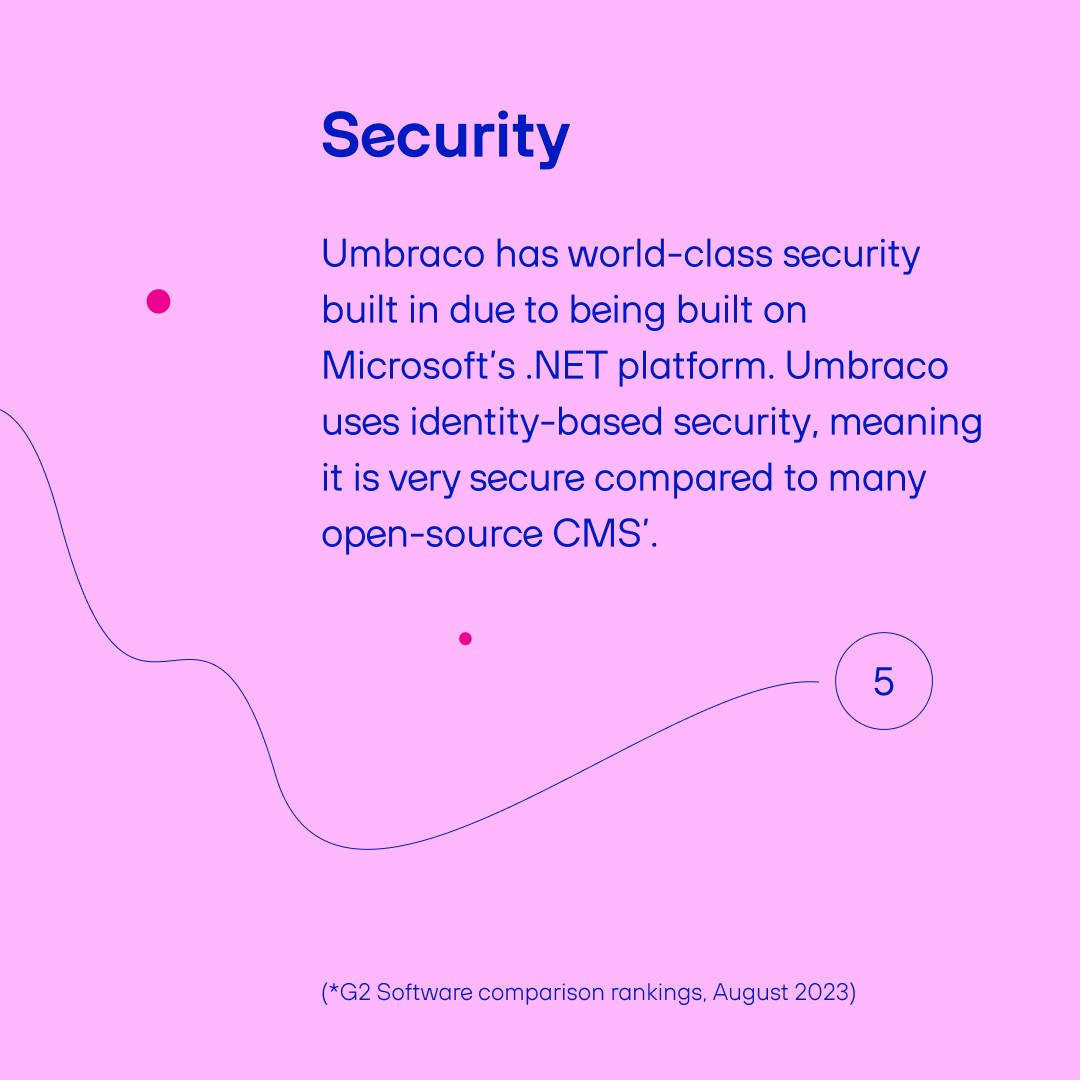Umbraco vs Wordpress
The battle of Open Source CMS has hotted up in recent years. If you’re considering a website replatform, is Wordpress or Umbraco a better option? We’ve dug into the considerations and picked out a few comparisons that are important in making your decision…
Re-platforming your website is major business decision.
The implications of choosing a different solution can be significant. You may well have used WordPress for a number of years, and be a fan, but there is an alternative world class Open Source solution out there: Umbraco.
Here we explore how Umbraco stacks up against a perennial favourite; WordPress.
Umbraco is one of the world's leading content management platforms. It’s Open Source, Licence free, and loved by over 730,000 businesses and organisations world-wide. An increasing number of larger businesses are making the switch to Umbraco. But, how does it compare when considered alongside the most widely used CMS platform in the world; WordPress.
Performance & SEO
Umbraco is inherently one of the fastest and lightweight frameworks on the market. As a result it naturally aids SEO performance, particularly post Google’s Core Web Vitals algorithm updates in the last couple of years, which place more emphasis on site performance than ever.
Umbraco has a number of automatic caching and indexing tools in its configuration that make it easier to optimise for speed, and wider performance. It’s also easier and faster to create and edit metatags and titles.
WordPress is built on PHP, which is not as lightweight-a framework as Umbraco’s .NET base. As a result, it doesn’t have the same level of performance naturally. Whilst 3rd party optimisation tools can be integrated such as minifiers or a Content Delivery Network (CDN) to enhance performance, you’re reliant on third party options and strengths/weaknesses and risks, whereas these are integral to Umbraco already.

Integrations & extensibility
Umbraco allows you to create what is called a composable DXP (Digital Experience Platform) which enables complete flexibility around the solutions that are integrated to create your specific, focused and custom DXP. Each tool can be selected based upon its ability to meet your specific requirements, and importantly are only integrated if and when they are needed, only paid for when they are used, and can be flexible enough to any existing tech infrastructure or platforms in place. It is entirely composable, and built headlessly (decoupling the back end from the front end) it can further benefit from a more flexible, scale-able solution, that is faster, and can re-use content across multiple front end applications.
WordPress’s front and back ends are tied together as it wraps display functionality into themes and plug ins. Whilst it can also be implemented or converted to a headless CMS, it’s not naively headless, and so this can result in slower performance compared to a purpose-built headless solution due to the extra load and overhead of the WordPress framework. It also potentially exposes greater security risks as a result of the normal front and back end connections.
In terms of the display layer, Umbraco is component based and not bound by templates in the way that WordPress is.

Ease of use
WordPress scores well in terms of ease of use for CMS users, and because its very widely used, many editors and content managers have experience of using it, and its fairly intuitive. Issues arise though in how it’s configured and set up. Because it’s so reliant on plug ins for even pretty basic functionality like adding a contact form, it requires more effort to both implement and maintain.
Umbraco is known as the friendly CMS. It is one of the most intuitive CMS platforms to work with as an editor or content marketer and requires minimal training. It’s been rated Easiest to Use and having Best Usability by Global Software marketplace - G2, when compared to hundreds of other platforms. It scores better than WordPress too on ease of use, set up and administration.
Impact & sustainability
A factor of growing importance is how energy efficient and sustainable the experience platform or CMS you choose is and how much the company is taking steps to reduce their environmental impact.
At an overall level, solutions built in C# and on Microsoft’s .Net Core, as Umbraco is are much more energy efficient than PHP-driven WordPress. Net is inherently more efficient, and uses less resources to both build and run.
Umbraco’s framework, and particularly its more recent iterations are incredibly lightweight and efficient. In addition, due to its composable nature, it’s by definition more efficient as it only uses what is required or integrated, so it out-performs WordPress on this front.
WordPress recently have sought to establish a formal sustainability team, but as yet outputs and results of that have not really been felt.
In the last few years, Umbraco has been on a journey to carbon neutrality. It is taking its impact very seriously. Earlier this year, they published their first annual impact report - https://umbraco.com/Umbraco-Impact-Report-2022/?utm_source=zoho&utm_medium=email&utm_campaign=impact-report-2022, in which Umbraco highlight their initiatives and successes in reducing CO2 emissions, as well as naming that the most recent versions of the platform on .Net Core provide 50% lower CO2 compared to the less efficient, earlier editions.

Security
Umbraco is built on Microsoft's . NET platform, so it utilises its Code Access Security (CAS). In conjunction with CAS, Umbraco uses identity-based security, meaning it is very secure compared to most CMS platforms.
Wordpress’s ubiquity makes it more vulnerable to threats and hacking. When you then factor in the extent and range of plug ins that are available (over 56,000 at the last count on the repository!) , and the fact that more 3rd party plug ins have to be used for WordPress to do what most require of it, that creates greater security vulnerability due to outdated plug ins or in many cases, the plug in is up to date, but the website hasn’t updated to the latest version of it. Recent reports claim that over 70% of WordPress websites have been compromised at some point. If your website is likely to require the capture and/or storing of personal and sensitive customer data in particular, its really worth considering these vulnerabilities.
So, if you’re a small business, with basic brochure-ware requirements for a decent website, WordPress can undoubtedly do the job, but for a more performant, SEO-friendly, flexible, secure and future-proof solution, we’d plump for Umbraco.
Any website platform can only achieve so much in and of itself, but choosing the right solution for your requirements can be such a strong foundation on which to create a transformative and effective digital experience.
If you’re considering re-platforming your digital estate or website or questioning the value you’re getting from your existing solution, get in touch to discuss your options. We’d love to help.





